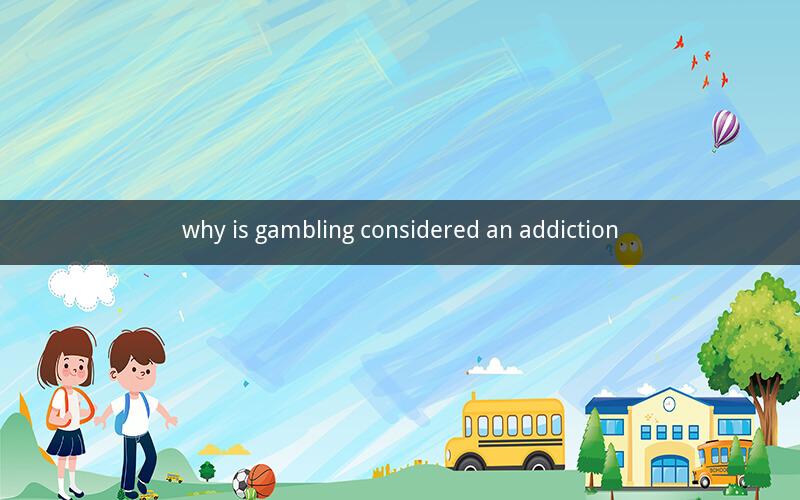
Why is Gambling Considered an Addiction?
Table of Contents
1. Understanding the Concept of Addiction
2. The Psychological Aspects of Gambling
3. The Role of Dopamine in Gambling Addiction
4. The Social and Economic Impacts of Gambling Addiction
5. The Cycle of Compulsive Gambling
6. Treatment and Support for Gambling Addiction
7. Conclusion
1. Understanding the Concept of Addiction
Addiction is a complex condition characterized by compulsive engagement in rewarding stimuli despite adverse consequences. It is often defined by a combination of physiological, psychological, and social factors. When it comes to gambling, the definition of addiction can be broken down into several key components.
2. The Psychological Aspects of Gambling
Gambling addiction, also known as pathological gambling, is a psychological disorder characterized by the inability to control the urge to gamble. This urge often becomes overpowering, leading individuals to prioritize gambling over other important aspects of their lives. The psychological aspects of gambling addiction include:
- Cognitive Dissonance: Gamblers often experience a conflict between their desires to win and the knowledge that gambling is a form of entertainment with unpredictable outcomes.
- Cognitive Biases: Gamblers may exhibit cognitive biases, such as the Gambler's Fallacy, where they believe they are due for a win after a losing streak.
- Emotional Regulation: Individuals with gambling addiction may use gambling as a means to cope with negative emotions, such as boredom, anxiety, or depression.
3. The Role of Dopamine in Gambling Addiction
The brain's reward system plays a crucial role in the development of gambling addiction. Dopamine, a neurotransmitter associated with pleasure and reward, is released in the brain when a person wins at gambling. Over time, this dopamine release can lead to the development of tolerance, where individuals need to engage in more gambling activities to achieve the same level of pleasure.
4. The Social and Economic Impacts of Gambling Addiction
Gambling addiction has significant social and economic consequences for individuals, their families, and society as a whole. Some of the impacts include:
- Financial Ruin: Individuals with gambling addiction may go into debt to finance their gambling habits, leading to financial instability and even bankruptcy.
- Relationship Damage: The emotional and financial strain caused by gambling addiction can strain relationships with family and friends.
- Work Performance: Compulsive gamblers may neglect their work responsibilities, leading to job loss or demotion.
5. The Cycle of Compulsive Gambling
The cycle of compulsive gambling typically involves four stages:
- Preoccupation: The individual becomes preoccupied with thoughts of gambling, planning when and where to gamble.
- Relapse: Despite efforts to control gambling, the individual relapses and returns to gambling.
- Binge: The individual engages in intense and uncontrolled gambling sessions.
- Remorse: After the binge, the individual experiences remorse, regret, and a desire to stop gambling.
6. Treatment and Support for Gambling Addiction
Treating gambling addiction often requires a multi-faceted approach that includes therapy, support groups, and lifestyle changes. Some of the treatment options include:
- Cognitive-Behavioral Therapy (CBT): CBT helps individuals identify and change negative thought patterns and behaviors associated with gambling.
- Support Groups: Groups like Gamblers Anonymous provide a supportive environment for individuals to share their experiences and receive advice.
- Medication: In some cases, medication may be prescribed to help manage symptoms of depression or anxiety that may contribute to gambling addiction.
7. Conclusion
Gambling addiction is a complex condition that affects individuals physically, mentally, and financially. Understanding the psychological aspects, the role of dopamine, and the social and economic impacts of gambling addiction is crucial for recognizing and addressing this issue. By seeking treatment and support, individuals with gambling addiction can overcome their compulsions and regain control over their lives.
Questions and Answers
1. Q: How does gambling addiction differ from casual gambling?
A: Gambling addiction is characterized by an inability to control the urge to gamble, despite negative consequences, while casual gambling is a recreational activity without significant negative impact on the individual's life.
2. Q: Can someone develop a gambling addiction without any family history of addiction?
A: Yes, while family history can be a risk factor, anyone can develop a gambling addiction due to a combination of personal vulnerabilities and environmental factors.
3. Q: Is there a specific type of person more susceptible to gambling addiction?
A: Certain individuals, such as those with a history of depression, anxiety, or other addictive behaviors, may be more susceptible to gambling addiction.
4. Q: Can someone who has recovered from gambling addiction relapse?
A: Yes, recovery from gambling addiction is a lifelong process, and relapse is possible. However, relapse does not mean the individual is destined to fail in their recovery efforts.
5. Q: How can I help a friend who I suspect has a gambling addiction?
A: Encourage your friend to seek professional help and offer support. Be patient and non-judgmental, and avoid enabling their behavior.
6. Q: Are there any legal consequences for gambling addiction?
A: While gambling addiction itself is not a criminal offense, the illegal activities associated with gambling, such as fraud or theft, can result in legal consequences.
7. Q: Can gambling addiction be cured?
A: Gambling addiction is a chronic condition, but it can be managed and controlled with proper treatment and support.
8. Q: Are there any medications specifically for gambling addiction?
A: Currently, there are no medications specifically designed to treat gambling addiction. However, medications may be prescribed to manage underlying conditions that contribute to the addiction.
9. Q: How can I tell if my child is developing a gambling addiction?
A: Signs may include secretive behavior, neglecting responsibilities, borrowing money, and experiencing mood swings or financial difficulties.
10. Q: Can online gambling contribute to addiction more than traditional gambling?
A: Online gambling can contribute to addiction due to its accessibility, anonymity, and the potential for rapid financial losses.